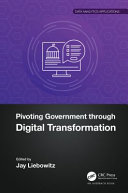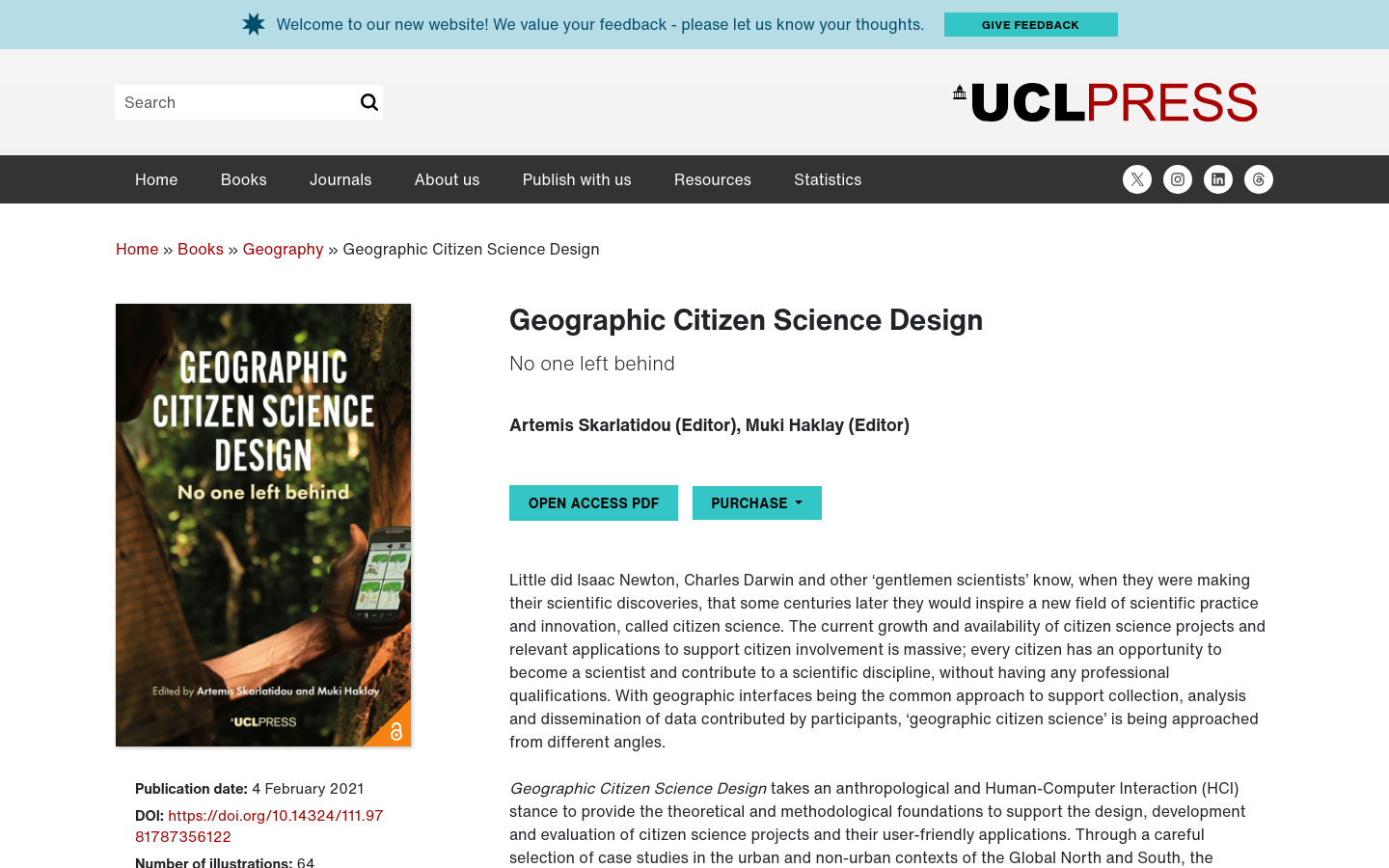Civic Tech Field Guide
Sharing knowledge and productively growing the fieldSearch Results - act (2981)
Showing 2981 Results

This book considers the ways in which the concept of the Rule of Law will need to evolve in order to ensure that the exercise of power by Artificial Intelligence (AI) does not become arbitrary and does not proceed unchecked.

Modern day and technology-rich environments require a reconceptualization of how the nature of technology influences urban areas

Anyone interested in using data for social good should read this book." —Stefaan Verhulst, Co-Founder of The Govlab, New York University and Editor-in-Chief of Data & Policy “The non-profit needs to build data capability so it continues ...

Located at the nexus between politics and the digital, this PhD thesis wants to shed light on the changing dynamics, opportunities and challenges citizens and parties are confronted with due to ongoing technological changes

Social networking is one of the most common online activities, and integral to the lives of people around the world

This thesis frames the ongoing collection of location data as an ongoing population survey. The ethics of data collection are beyond the scope of this work.

Moreover, disclosures concerning algorithmic systems often take place when their shortcomings (potential harms) are inadvertently exposed, often through the work of public interest groups

The Deliberative Democracy Handbook is a terrific resource for democratic practitioners and theorists alike

Social innovations are products, services and models that meet social needs and generate new social connections or collaborations.

In particular, the following key questions are of primary interest: Urban fabric: How is 'sharing' shaping cities? Does it represent a paradigm shift with tangible and physical reverberations on urban form?

The purposes of this study are to 1) examine how well the legislative systems developed or used by the U

Highlighting a range of topics such as social media and politics, civic activism, and public administration, this multi-volume book is geared toward government officials, leaders, practitioners, policymakers, academicians, and researchers interested in active citizen participation and politics.

User research is an effective strategy to gain a deeper understanding of your target audience — a crucial step in order to choose efficient design solutions and build smart products

The world is a heavily segregated place where we are first separated by the seven continents, broken down into many countries, then by cities, trickling all the way down to towns branching off into neighborhoods and individual homes that ...

I love this book! At a time in which activism must urgently rise to be a much more effective tool for systems change, Mueller gives us a deeply researched yet practical reference book to methodically take activism from passion to impact

This book explores the challenges that disinformation, fake news, and post-truth politics pose to democracy from a multidisciplinary perspective

A San Francisco Chronicle Best Book of 2016: “Intelligent and impassioned, Citizen Scientist is essential reading for anyone interested in the natural world

Packed with practical classroom resources, examples from popular culture, and engaging insights into the CIA analyst role, this book is designed to support middle and high school teachers with news and media literacy in social studies, ...

Working with Data in the Public Sector: From Fear to Enthusiasm is the first book designed for practicing and future public administration professionals to help overcome any anxiety about using data effectively in their roles.

Using numerous cities from different regions around the globe, the book compares how smart cities of different sizes are evolving in different countries and continents.

In democratic societies there is widespread acknowledgment of the need to incorporate citizens’ input in decision-making processes in more or less structured ways.

Informed by a comparative case study approach, this book seeks to narrow that gap and offer practical policy solutions to facilitate local e-government.

In Democracy 2.0, we feature a series of evocative, international case studies that document the impact of alternative and community use of media, in general, and Web 2.0 in particular.

This book offers conceptual frameworks, theoretical insights, and practical lessons for dealing with the problem

In this counterintuitive study of digital democracy, Jen Schradie shows how the web has become another weapon in the arsenal of the powerful, and a potent weapon for conservative activists

This book uses a combination of descriptive statistical analysis and real-world case study narratives to evaluate the ways in which each individual urban variable or their combination matter in the diversity of smart city approaches around ...

This is an essential guide for government employees, scholars, and regular citizens who want to make government work more effectively and democratically in the digital age.

PRAISE FOR SMART CITIES, SMART FUTURE "Mike and Cornelia have managed to distill hundreds of ideas, sources, milestones, technologies and dreams into a thoughtful 'showcase of tomorrow'. . . their analysis, synthesis and narrative make this ...

The book covers issues presented by the technological changes on policy making and offers a wide array of perspectives

Geographic Citizen Science Design
United Kingdom of Great Britain and Northern Ireland (the)This book presents a selection of wide-ranging case studies that provide insights into the design, interaction barriers, and lessons learned from a diverse set of participants.

This volume provides an important update to our current understanding of politics and the internet in a variety of new contexts, both geographically and institutionally

Instructor and sustainable design expert Scott Boylston explains the relationship between design thinking and social innovation and teaches us about the impact design can have on global goals, including sustainable development, anti-racism, ...

In this book, a number of leading democratic theorists address the key issues that surround the theory and practice of deliberative democracy

In this book, the real-world implementations of successful Smart City technology in places like New York, Amsterdam, Copenhagen, and more are analyzed, and insights are gained from recorded attempts in similar urban centers that have not ...

The chapters in this book focus on the design, development, implementation, use, and evaluation of information system technologies and methodologies to support crisis response and management, as well as technology management-related issues

With The Data Journalism Handbook, you’ll explore the potential, limits, and applied uses of this new and fascinating field.

Shapiro brings much-needed empirical research to a field that has often relied on “10,000-foot views.” Timely, important, and expertly researched, Design, Control, Predict doesn’t just help us comprehend urbanism today—it advances ...

This book provides the most current and comprehensive overview available today of the critical role of information systems in emergency response and preparedness

The Propagandists' Playbook peels back the layers of the right-wing media manipulation machine to reveal why its strategies are pervasive, while humanizing the people whose worldviews and media practices conservatism embodies. Based on interviews and ethnographic observations of two Republican groups over the course of the 2017 Virginia gubernatorial race--including the author's firsthand experience of the 2017 Unite the Right rally--the book considers how Google algorithms, YouTube playlists, pundits, and politicians can manipulate search, reaffirm beliefs, and expose audiences to extremist ideas, blurring the lines between reality and fiction. Tripodi argues that conservatives who embody the Christian worldview give authoritative weight to original texts and interrogate the media using the same tools taught to them in Bible study--for example, using Google to "fact check" the news. The result of this practice, tied to conservative marketing tactics, is a radicalization of content and a changing of narratives adopted by the media.

This book illustrates how social media platforms enable us to understand everyday politics and evaluates the extent to which they can foster accountability, transparency and responsiveness

Hence the volume offers an intellectual resource that expands on the current literature, but also provides a pedagogical resource to universities as well as a reflective opportunity for practitioners.

Digital Democracy considers how technological developments might combine with underlying social, economic and political conditions to produce new vehicles for democratic practice. The growth of new Information and Communication Technologies (ICTs) such as the Internet, alongside growing concerns about the failure of advanced societies to live up to the democratic idea, has produced much interest in the prospects for a digital democracy. This book will provide invaluable reading for those studying social policy, politics and sociology as well as for policy analysts, social scientists and computer scientists.

Starting from the 1980s, this book provides the first, complete history of the idea of deliberative democracy, analysing its relationship with the earlier idea, and practices, of participatory democracy in the 1960s and 1970s.

This book examines how international organisations (IOs) have struggled to adapt to the digital age, and with social media in particular



